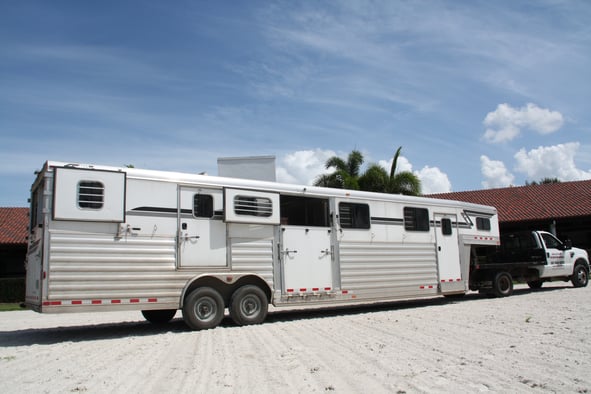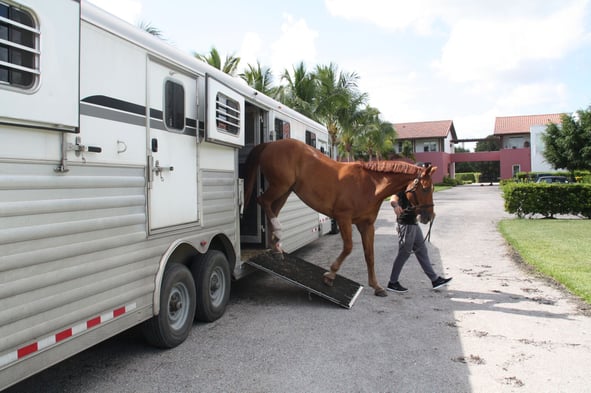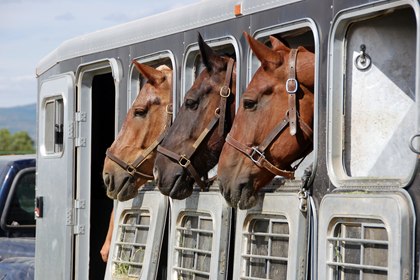Are you doing things right when it comes to horse trailer safety?Despite good intentions, many people are making dangerous mistakes when they trailer their horses. That’s why we’ve compiled this list of our top 10 safety tips to make sure every ‘hitch up’ goes smoothly and without incident.
Tip #1: Use a properly equipped tow vehicle and hitch.
This may seem like Horse Trailering 101, but this is actually a very common mistake! People will often buy a state-of-the-art new vehicle and assume that it is able to tow a fully loaded trailer. We’ve even caught dishonest salesman trying to mislead buyers on the sales lot. An improperly matched truck, hitch, and trailer combo can cause disaster on the road.
Learn about the tongue weight of your horse trailer and make sure that your hitch is up to the challenge. Then, double check that your tow vehicle is able to handle a fully loaded trailer. You may need to consider an add-on like weight distribution arms (sway bars) to safely tow your rig.

Tip #2: Hang your hay net high off the ground.
You may pack a hay net to its limit to keep your horse happily munching during a trip. Just remember that the bottom of the net is going to sag lower and lower as it is emptied.
First off, a horse with a stuck leg is not a happy horse. Secondly, binding nylon rope can cause severe damage to the delicate soft tissues at the back of their leg. Much like an improperly applied leg wrap, this tourniquet effect can cause bowed tendons and lasting injury.
Tip #3: Do a full pre-flight check on your trailer before setting out.
Many trailers are stored outdoors so they are exposed to the elements. Rain, ice, and the hot sun, can wreak havoc on your trailer weakening it over time. Tire rubber can become stiff and brittle causing sudden blow outs while on the road. They should be changed regularly even if tires are not worn down. Also check for rust, weakened floorboards, faulty signal lights, sharp exposed surfaces and even nests from stinging insects. You may be interested in our Smart Travel Checklist!
Tip #4: Practice trailering with your horse.
Even the most well behaved horse can become trailer sour if he goes several seasons without travel. Make it a regular habit to practice loading, unloading, and traveling with your horse. In addition, give your horse time to acclimate to a brand new trailer before setting off on a big trip. Remember that horses see trailers as ‘traps’ and it can take some time for them to build up their confidence when faced with a new rig.

Tip #5: Check that your trailer is not too hot and your horse is well hydrated.
Aluminum horse trailers with mill-finished roofs can become dangerously hot during the summer months. Any horse trapped in this situation is in danger of dehydration from excessive sweating and heat exhaustion.
You should also make sure your horse stays well hydrated over long trips. Read this article to learn how to check for signs of dehydration and tricks to make them drink more water when they need it.
Tip #6: Drive responsibly.
If your regular driving habits don’t change at all when there are horses behind you, then something is wrong. You should be conscious of their presence and use safe driving practices like gradual turns, slower deceleration, and more frequent stops to ensure they have a pleasant ride. Learn more driving tips here. Tired of driving? Use Equo! You can book our horse transport services by clicking Book Now!
Tip #7: Don’t let your horse hang its head out of a trailer window during travel.
Heads, tails, or any body part really. A horse trailer is designed to protect your horse while he’s inside the trailer. As soon as part of his body is hanging out, he is more at risk. Eyes can be injured by flying road debris and horses can be ejected during severe accidents. Do your horse a favor and close the safety bars on the windows. You don't want to look like a cheap horse transport

Tip #8: Never leave a loaded horse unattended with the doors or windows open.
When you first arrive to an event, it may seem convenient to leave your horse in the trailer while you go register, meet friends, or find your bearings. Just make sure that someone else stays back with the horses. We’ve heard stories of horses literally trying to leap through manger windows in panic situations. Small windows…big horse… you do the math.
Tip #9: Don’t saddle your horse before trailering.
Sure, it’s more convenient to arrive at your destination with a horse saddled and ready to go. But, stirrups hanging on the side of a horse’s body can be uncomfortable during travel if your horse tends to lean against the dividers. This may make them become trailer shy over time.
Tip #10: When in doubt…ask for help!
If you there is an aspect of trailering that has you stumped, check for help from your network. A trusted trainer or friend may be able to help you teach your horses to better handle a situation.
What are some more safety tips that you’d recommend for our readers? Thank you to the people who have replied in the past with their suggestions.
This list was created based on Double D Trailers blog post. If you want to know more about them click here



